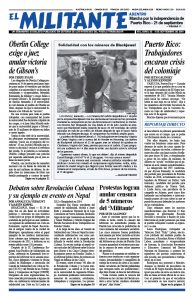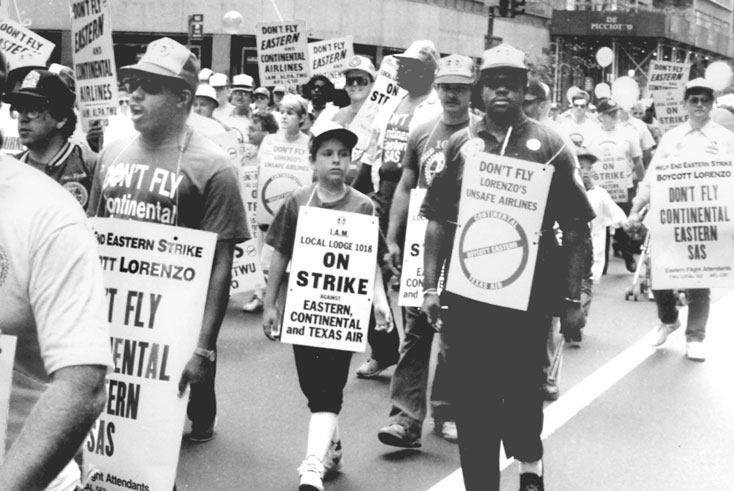The owners and editors at the New York Times, long one of the capitalist rulers’ central media outlets, are in the midst of a wrenching shift in the “story” they try to peddle daily.
For the last three years, like most of the liberals and middle-class left, they have relied on the witch hunt led by former FBI boss Robert Mueller to impeach or indict President Donald Trump. Their pages have been filled with harangues against Trump and against the workers who either voted for him or decided — after looking at both Trump and his main bourgeois opponent, Hillary Clinton, who called them “deplorables” — to sit that one out.
But now Executive Editor Dean Baquet told a 75-minute rancorous staff meeting, recorded and leaked to Slate, that they all had to realize, “Holy shit, Bob Mueller is not going to do it.”
So, Baquet said, they have to change their “story.”
“How do we write about race in a thoughtful way, something we haven’t done in a large way in a long time,” he said. That “is the vision for coverage for the next two years,” through the 2020 elections. Then they hope to have a new “story.”
The meeting was called after the paper ran a factual headline, “Trump Urges Unity Vs. Racism,” over a story on a statement by Trump after the deadly El Paso shootings. This headline led to a firestorm of criticism from both readers and staff. The paper’s headlines and stories, they cried, have to label Trump and the workers who voted for him as racists and “white supremacists.”
Not only will the Times take this mission on — though with perhaps a little more “nuance” than some would like, Baquet said — but they’ll also change their “story” about all of U.S. history to fit their race-baiting.
The Times “will publish the 1619 Project, the most ambitious examination of the legacy of slavery ever undertaken,” Baquet said, “to try to understand the forces that led to the election of Donald Trump.”
The paper’s Aug. 14 edition proclaimed that the series would “reframe the country’s history,” with everything informed by slavery.
The ‘Times’ new ‘story’
Typical of the paper’s new “story” is an op-ed column in the Aug. 14 issue by Joe Walsh, who is standing against Trump for the Republican nomination. “Trump is a racial arsonist who encourages bigotry and xenophobia to rouse his base and advance his electoral prospects,” Walsh screams.
This same shift to anti-working-class race-baiting is well underway in other media organs of the pro-Democratic Party anti-Trump “resistance” — from the Washington Post to the Workers World Party paper, which claims he heads a “fascistic movement.”
Claims of a rise in white supremacist attitudes in the working class obscure the real cause of disaffection with the candidates of both capitalist parties — the carnage from decades of grinding economic and social crisis presided over by Democratic and Republican administrations alike. This is key to understanding politics in the U.S., or anywhere else — the sharply counterposed class interests between the capitalist rulers and the working class.
There is less racism among working people today, not more. This is a result of “the mass, proletarian-led movement for Black rights in the 1950s, 1960s, and early 1970s,” Socialist Workers Party National Secretary Jack Barnes explains in Malcolm X, Black Liberation, and the Road to Workers Power.
Attack on class consciousness
Far from advancing the fight against racist discrimination, the Times 1619 series minimizes the real record of the struggle against it, from slave revolts to the Civil War — the Second American Revolution — to the fight against Jim Crow and the mass Black-led battle that overthrew it.
Nikole Hannah-Jones, organizer of the 1619 Project, says, “Anti-black racism runs in the very DNA of this country.” In other words, if you’re Caucasian and from the U.S. you must be racist, and drenched with “white privilege.”
Race-baiting is a scourge used by the capitalists and their meritocratic enablers like the Times to try and shut up and attack the political rights of those they disagree with — above all the “deplorable” workers they fear.
The Times editors seek to “reframe” history from the standpoint of the class they are part of, deflecting attention from the bloody rise of capitalist exploitation, and how the capitalist rulers use racism and every other form of prejudice to try and keep workers divided and intensify competition among us.
The Times new version of history also denies the significance of the revolution of 1776 that freed the country from the stultifying grip of the British crown, paving the way for the further development of capitalism and with it the modern working class, and inspiring toilers worldwide.
As V.I. Lenin, central leader of the 1917 Russian Revolution, said, the American Revolution was one of history’s great, liberating revolutionary wars.
It was revolutionary class struggles that were crucial at all the turning points in the history of the U.S. And they will be in the future.
Above all what the Times view of history obscures is the growth of self-confidence and fighting capacities of workers who took part in these battles. And how this deepened their class consciousness as they came to see and act towards other working people as fellow fighters.
The Times editors and the class they write for seek to keep workers ensnarled in the capitalist rulers’ two-party system, to prevent us from organizing to fight against capitalist exploitation and oppression. They aim above all to prevent us from gaining class consciousness and self-confidence in a united fight to take political power into our own hands.


